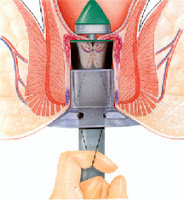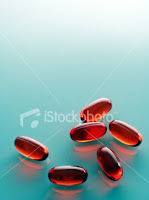 What causes hemorroids is most common question ask by many because they don’t want to suffer the effect brought by hemorroid. So for precautions, they are eager to know what causes hemorroid. But before we discuss of what causes hemorroids, lets take a tour on what is hemorroid is all about.
What causes hemorroids is most common question ask by many because they don’t want to suffer the effect brought by hemorroid. So for precautions, they are eager to know what causes hemorroid. But before we discuss of what causes hemorroids, lets take a tour on what is hemorroid is all about.
Hemorroids are swollen blood vessels of the rectum. The hemorroidal veins are located in the lowest area of the rectum and the anus. Sometimes they swell because the vein walls become stretched, thin, and irritated by passing bowel movements. Hemorroids are classified into two general categories: internal and external.
• Internal hemorroids lie far enough inside the rectum that you can't see or feel them. They don't usually hurt because there are few pain-sensing nerves in the rectum. Bleeding may be the only sign that they are there. Sometimes internal hemorroids prolapse, or enlarge and protrude outside the anal sphincter. If so, you may be able to see or feel them as moist, pink pads of skin that are pinker than the surrounding area. Prolapsed hemorroids may hurt because the anus is dense with pain-sensing nerves. They usually recede into the rectum on their own; if they don't, they can be gently pushed back into place.
• External hemorroids lie within the anus and are usually painful. If an external hemorroid prolapses to the outside (usually in the course of passing a stool), you can see and feel it. Blood clots sometimes form within prolapsed external hemorroids, causing an extremely painful condition called a thrombosis. If an external hemorroid becomes thrombosed, it can look rather frightening, turning purple or blue, and could possibly bleed. Despite their appearance, thrombosed hemorroids are usually not serious and will resolve themselves in about a week. If the pain is unbearable, your doctor can perform hemorroid removal to the thrombosed hemorroid, to stops the pain
Anal bleeding and pain of any sort is alarming and should be evaluated; it can indicate a life-threatening condition, such as colorectal cancer. Although hemorroids are the No. 1 cause of anal bleeding and are rarely dangerous, but a definite diagnosis from your physician is a must.
So what causes hemorroids then? The main cause of hemorroids is the pressure applied on veins of pelvic and rectal system. This pressure comes from different habits that the patient has in his bathroom, constipation, diarrhea, sitting or standing for a long time, obesity, pregnancy or genetic factors. In the next lines, we will detail a little each hemorroid cause and bring some solutions to it.
- 1. Adopting a wrong position on the toilet seat is one of the main causes of hemorroids. Here is correct way to sit; a person should follow when sitting on the toilet: sit on the toilet normally, then raise your feet up on tiptoes and balls of feet (front part of foot) and bend forward with your elbows to your knees. This position allows the bowel to come out with little effort, thus lessening the chance of hemorroids coming through the hole and reducing the chance of developing new hemorroids.
- 2. Constipation is another cause of hemorroids. Straining to pass hard stools puts too much pressure on the rectum and makes the veins swell (like varicose veins behind the knees). To avoid the internal problems caused by constipation, when you go to the toilet, take your time; let nature do its thing. Try gentle deep breathing and avoid holding your breath, to put a little pressure on the bowel to come out.
- 3. Diarrhea is a factor that damages the veins. In this case, there are frequent passing of stool, and even though the fecal matter is soft, it dampens the intestine at the same time and causes the hemorroid disease. Take a good care of your health, always wash your hands before eating and always wash the fruits and vegetables before consuming them.
- 4. Wiping too hard or too long may also cause or aggravate hemorroids. The bowel should evacuate the contents well, reducing the need for excess wiping, if you followed the suggestions of extra fiber and water. Also, use a soft damp cloth that absorbs a lot.
- 5. Other important cause of hemorroids is pregnancy. Maximum pressure is exerted during delivery time and this increases the anal pressure while the baby is pushed out. To prevent hemorroids from showing, you must do a lot of exercise during the pregnancy, especially in the beginning.
- 6. Heavy lifting straining can cause hemorroids to show themselves and can possibly cause hemorroids to develop. If your job requires heavy lifting, discuss this issue with someone specially trained in your work area.
- 7. Liver disease can also cause increased pressure in the veins, as blood is pooled in and around the pelvic system. Don’t drink too much alcohol or coffee, don’t eat junk food, and try to keep your liver and your heart healthy.
- 8. If you are overweight, you are lifting your excess weight up every time you stand or walk or run. Especially when sitting, the pressure of your body is bearing on your anal region and may well be weakening it or aggravating existing hemorroids. To help alleviate the suffering from hemorroids and perhaps prevent new hemorroids from developing, you should try to loose the excess weight you are carrying around on your body.
- 9. Another factor that counts is heredity. Some people are genetically predisposed to this type of illness and there aren’t too many things we can do about it. Do a lot of sport, especially to train and relax your anal sphincter muscles (the ring of muscles that surrounds the anal opening).
- 10. Anal sex is another cause of hemorroids. No matter how much lubricant it’s used; keep in mind that the anus wasn’t designed for this function. If we remember that just wiping the area with toilet paper is considered a risk, you will get the picture yourself of how much problems can cause this type of sexual intercourse.
Although hemorroids are rarely dangerous, they can be a painful recurrent bother, as you've found. Fortunately, most hemorroid symptoms improve dramatically with simple measures. Here are some things to try:
- Add fiber. Boost the fiber in your diet with high-fiber foods, a fiber supplement or both. When taken with adequate fluid, fiber softens stools and makes them easier to pass, reducing pressure on hemorrhoids and lowering the risk of bleeding, inflammation and swelling.
- • High-fiber foods include prunes, dates, apples, pears, strawberries, broccoli, brussels sprouts, carrots, peas, spinach, legumes (for example, baked beans or kidney beans), bran cereals and oatmeal. Fiber supplements include psyllium (Metamucil, Konsyl, Perdiem), methylcellulose (Citrucel), calcium polycarbophil (FiberCon, Fiber-Lax, Mitrolan) and wheat dextrin (Benefiber). Fiber can cause bloating or gas, so start slowly, and gradually increase your intake to 25 to 30 grams of fiber per day. Increase your fluid intake at the same time.
- • Exercise. You can stimulate bowel function with moderate aerobic exercise, such as brisk walking 20 to 30 minutes a day.
- • Go when you have to go. When you feel the urge, go to the bathroom immediately; don't wait for a more convenient time. Your stool can back up, leading to increased pressure and straining.
- • Take sitz baths. You can often relieve itching, irritation and spasm of the sphincter muscle with a warm water bath for the buttocks (sitz bath). Sit in a few inches of warm water in your bathtub or in a small plastic tub that fits over a toilet seat. Try a 20-minute sitz bath after each bowel movement and at two or three other times during the day. Afterward, gently pat the anal area dry; don't rub or wipe hard because this can cause irritation to your hemorrhoids.
- • Try over-the-counter hemorroid creams. These can temporarily soothe pain, irritation and itching. Hemorroid cream and suppositories containing hydrocortisone are also effective, but don't use them for more than a week at a time, because they can cause the skin to get too thin. Witch hazel wipes (Tucks) are soothing and have no harmful effects. A small ice pack placed against the anal area for a few minutes may also help. Finally, sitting on cushions rather than hard surfaces can help reduce swelling.





